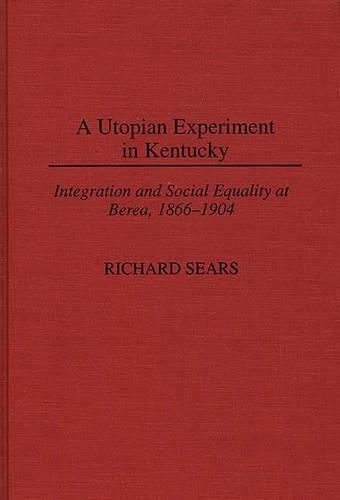
A Utopian Experiment in Kentucky: Integration and Social Equality at Berea, 1866-1904
(Hardback)
Publishing Details
A Utopian Experiment in Kentucky: Integration and Social Equality at Berea, 1866-1904
By (Author) Richard Sears
Bloomsbury Publishing PLC
Praeger Publishers Inc
23rd August 1996
United States
Classifications
Tertiary Education
Non Fiction
Anthropology
Social and ethical issues
History of the Americas
Ethnic studies / Ethnicity
Cultural studies
305.8009769
Physical Properties
Hardback
272
Width 156mm, Height 235mm
595g
Description
A major social and educational experiment in race relations was conducted in Berea, Kentucky, from 1866 to 1904. During those years Berea contained a community, school, and church which were all fully integrated: white people, mostly from the Kentucky Appalachian region, and black people, former slaves and their children, from the Blue Grass country, lived, worked, and studied together in an atmosphere designed to foster social equality. Sears demonstrates that integration and social equality among the races are not unrealizable ideals; at Berea in the second half of the 19th century these ideals were lived out in practical terms. The Berea project was killed by state and federal legislation, not by being intrinsically unworkable.
Reviews
.,."Sears...presents a cogently written, thoroughly documented history of this "Utopian experiment" during the decades when it was "a well-known and singular example that black people and white people could live, work, study, worship, and play together, the period when integration and social equality actually worked.""-Utopian Studies
...Sears...presents a cogently written, thoroughly documented history of this "Utopian experiment" during the decades when it was "a well-known and singular example that black people and white people could live, work, study, worship, and play together, the period when integration and social equality actually worked."-Utopian Studies
The devourer of all things Civil War will likely ignore this book because of the title's subject matter and time frame....This is unfortunate; this work is an important contribution to the history of American slavery, the abolitionist movement's role in the eduction of former slaves, and most importantly, the vision and forty-year-long successful operation of the only fully intergrated community and educational experiment in the South following the Civil War....The historian will find the text, generous end notes, and the excellent bibliography to be of great value in broadening their familiarity with the educational and religious contexts of the time. Sears has produced a true labor of love yet has largely distanced his passions and partiality from the work. He has pulled no punches, and his fair and comprehensive treatment offers a great rewards to the interested reader and scholar.-Civil War History
..."Sears...presents a cogently written, thoroughly documented history of this "Utopian experiment" during the decades when it was "a well-known and singular example that black people and white people could live, work, study, worship, and play together, the period when integration and social equality actually worked.""-Utopian Studies
"The devourer of all things Civil War will likely ignore this book because of the title's subject matter and time frame....This is unfortunate; this work is an important contribution to the history of American slavery, the abolitionist movement's role in the eduction of former slaves, and most importantly, the vision and forty-year-long successful operation of the only fully intergrated community and educational experiment in the South following the Civil War....The historian will find the text, generous end notes, and the excellent bibliography to be of great value in broadening their familiarity with the educational and religious contexts of the time. Sears has produced a true labor of love yet has largely distanced his passions and partiality from the work. He has pulled no punches, and his fair and comprehensive treatment offers a great rewards to the interested reader and scholar."-Civil War History
Author Bio
RICHARD SEARS, Professor of English at Berea College in Kentucky, is the author of several books and articles dealing with the unique history of Berea, including the recent Kentucky Abolitionists in the Midst of Slavery and a well-known work of local history, Madison County: 200 Years in Retrospect. He also wrote the script for a public television production called Once Upon a Vision: The Story of Berea, 1854-1904, which was narrated by Alex Haley.
